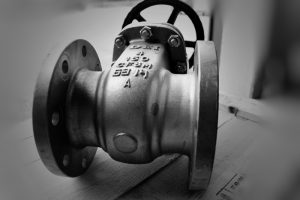Advantages and disadvantages of the most versatile valve: the globe valve. We could talk about globe valve as the ones you should keep always in your pocket or –better– in your pen while planning, as they are now the most used. The spherical body is the most evident characteristic of this type of valves. Then their leading parts are a movable disk-type element and a stationary ring seat in the body.
Then the bonnet, that provides a leakproof closure for the valve body. Modern globe valves can also have a cage surrounding the plug inside the body of the valve itself and managing the flow.
They are definetly the most common type of valves in use because they work on a linear motion and also for throttling applications in a pipeline.

Spherycal body, versatile solutions
Globe valve consist of two halves separated by an internal baffle, that forms a seat. In this seat a plug –the disk or disc-type element– can be screwed to open or shut the valve: moving up and down it regulates the flow. In this kind of valve, the plug is connected to a stem. The stem is operated by the screw action using a handwheel in manual valves and by an actuator assembly in automated globe valves.
Principal features of globe valve are
- easy closure capability
- quite easy to be serviced
- shorter stroke comparing to a gate one
- use as a check valve
Globe valves have just a controversial point: when a globe valve is partially open it is difficult to understand if it is open or close.
Despite the name, many globe valves do not now longer have a spherical shape.
The ideal application of globe valves is where a strict regulation of the flow is required, as in emergency suction pipelines.
Types of globe valve
Due strictly to their ‘shape’ there are basically three main types of globe valve.
Tee globe valve
Tee globe valves are the most common globe valves in use. The seat has an horizontal setting that allows stem and disk to move perpendicularly to the horizontal line. As they have the lowest coefficient of flow and highest pressure drop, they best fit where a strong throttling is needed.
Angles globe valves
These valves are a variation of the tee globe valves. Their ends are at a 90° angle that allows a single 90 degrees turn. Their best use is to regulate periods of pulsating flow because angle globe valves easily handle a slugging effect.
Wye globe valves
Wye globe valves are quite used alternative for high pressure drop – commonly to regulate throttling during seasonal or start-up operations. Their 45° angle design do offers a straighter flowpath when it is fully open and provides the least resistance to flow.
Lastly we have to remember the difference between DIN, ANSI and JIS standard that define the distinguishing characteristics of globe valves for German, American anche Japanes markets.
Advantages and Disadvantages of globe valves
Using globe valves we can count on really universal and reliable elements, but just let us have a quick look through the most interesting advantages and disadvantages they produce.
Strengths
- Simple structure
- convenient production
- easy maintenance
- Small working stroke: that means short opening and closing time
- Quite good throttling capability
- Possiblity to be uses as stop-check valves
- Good sealing: low friction between the sealing surfaces and consequentely a long service life
Weaknesses
- high pressure drop
- not suitable for medium with particles
- greate force or larger actuator to seat the valve are required
- weak regulation performance
Keep in touch
Please, feel free to check our distributor page in order to che more details of DEI.
DEI is an official Bonney Forge distributor and we have two social network pages: Facebook Official Fan Page and Linkedin profile too.
